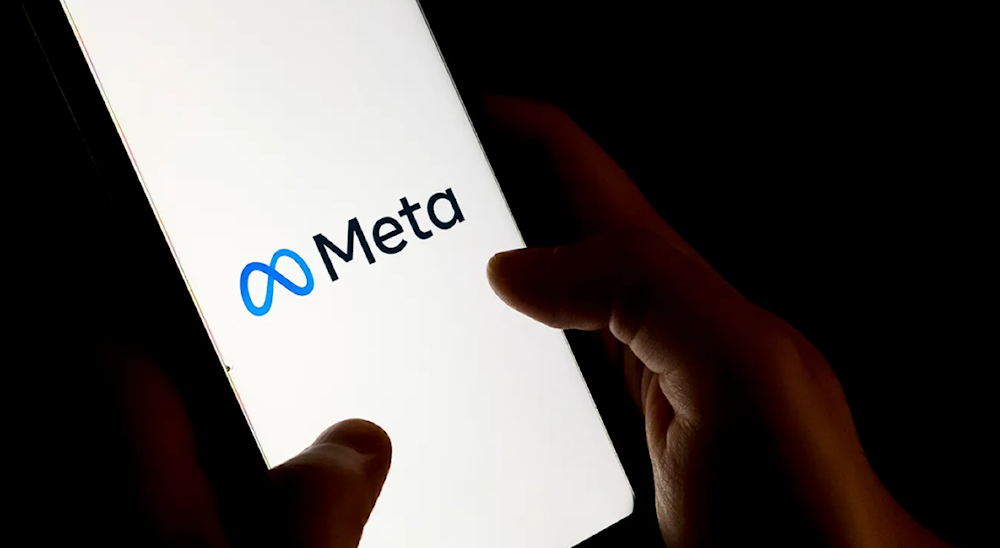Meta considering increased censorship over word 'Zionist': Reports
Israeli lobbies like the Anti-Defamation League have tried to treat any criticism of Zionism, a political ideology, as a form of anti-semitism.
-

A Meta logo is seen displayed on a smartphone screen in Chania, Greece, on August 23, 2023 (AP)
According to The Intercept, sources have revealed that Meta is considering stricter rules for discussing so-called Israeli nationalism on its platforms, a major policy shift that could stifle criticism and freedom of speech on the war in Gaza and more.
Five civil society sources briefed on the potential change told The Intercept that according to an email sent by Meta policy personnel “Meta is currently revisiting its hate speech policy, specifically in relation to the term ‘Zionist.'’”
The email details that the policy is being reviewed due to recently reported content by stakeholders and users, without mentioning the content or name of any stakeholders.
Dani Noble, an organizer with Jewish Voice for Peace, expressed that the organization was "horrified" to hear that the term Zionist which is a political ideology would be conflated with Jewish, which is an "ethno-religious identity."
Meta's internal guidelines regarding the word "Zionist," originally published by The Intercept in 2021, claimed that company moderators are only intended to remove postings containing the phrase if they are considered to be a proxy for "Jewish" or "Israeli," both of which are protected classes under corporate speech policies. Meta is now proposing a policy change that would allow the platform's moderators to more aggressively and expansively apply this restriction, perhaps increasing removals of posts critical of Israeli nationalism.
Meta spokesperson Corey Chambliss denied the change was due to any external lobbies or pressure. He told The Intercept that the "polarized public discourse" surrounding the Middle East makes the possible change something to assess for review to understand how to avoid attacks on people's "protected characteristics," like nationality or religion.
Pro-Israeli lobbies like the Anti-Defamation League (ADL) have tried to treat any criticism of Zionism, a political ideology, as a form of anti-semitism.
Yasmine Taeb, legislative and political director at the Muslim grassroots advocacy group MPower Change stated that the ADL and American Jewish Committee, another Zionist lobby in the US have attempted to get Meta to censor the word.
Taeb warned that such censorship would result in any criticism of Zionism being stifled, including non-hateful, non-violent speech about the war on Gaza.
Civil society advocates have pointed to the fact that stating that one does not "like Zionists" is far from anti-Jewish since many Jewish organizations have been the most outspoken against the Israeli government's genocide of Gaza.
Taeb expressed that pro-Palestine sentiment is being silenced "specifically during the genocide in Gaza,” and that Meta should be ensuring that political speech does not get suppressed.
Nadim Nashif, executive director of the Palestinian digital rights group 7amleh, in the review materials by Meta's hypothetical posts that could be deleted since they referred to specific control of Jewish people and the media, but others spoke only of criticism directed at the Israeli occupation and not the religion of Judaism.
Censoring Palestine: Flawed Meta policies, undue gov. influence - HRW
Human Rights Watch (HRW) issued a report in Decemeber titled "Meta's Broken Promises: Systemic Censorship of Palestine Content on Instagram and Facebook," which reveals how moderation rules and algorithms have progressively repressed voices in support of Palestine on Instagram and Facebook and suppressed protected speech, including nonviolent communication in favor of Palestine and public discussion about Palestinian human rights.
According to HRW, an overreliance on automated technologies to monitor material and disproportionate government control over content deletions contribute to censorship.
Deborah Brown, acting associate technology and human rights director at HRW, said the censorship added "insult to injury at a time of unspeakable atrocities and repression already stifling Palestinians’ expression."
Brown notes that social media is a tool to witness this abuse and speak out against it and that censorship only furthers the suffering of Palestinians.
HRW investigated 1,050 instances of online restriction from more than 60 nations where 6 patterns of censorship were identified, each happening at least 100 times.
The incidents are consistent with years of research and campaigning by Palestinian, regional, and international human rights organizations, showing Meta's filtering of Palestinian-supporting content.
These patterns include content removals, account suspension or deletion, inability to engage with content, inability to follow or tag accounts, restrictions on the use of features, such as Instagram/Facebook Live, and "shadow banning", which refers to a significant reduction in the visibility of an individual's posts, stories, or account without notification.

 5 Min Read
5 Min Read








